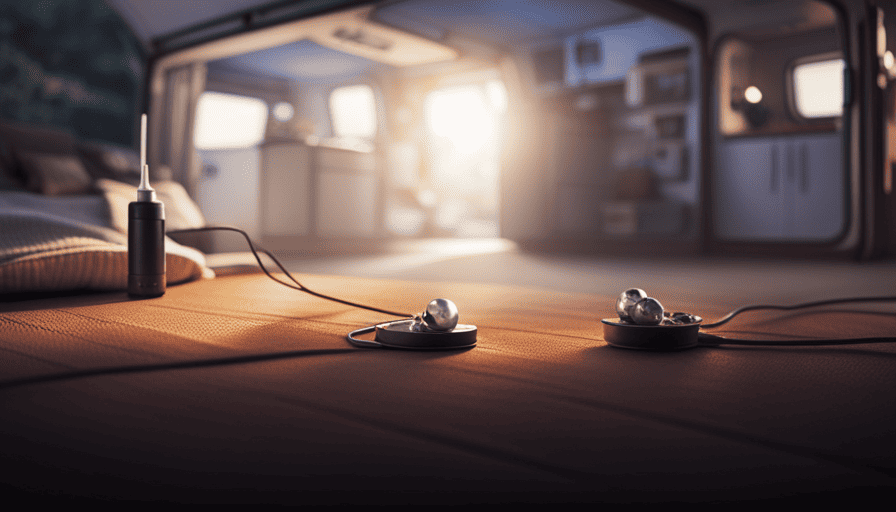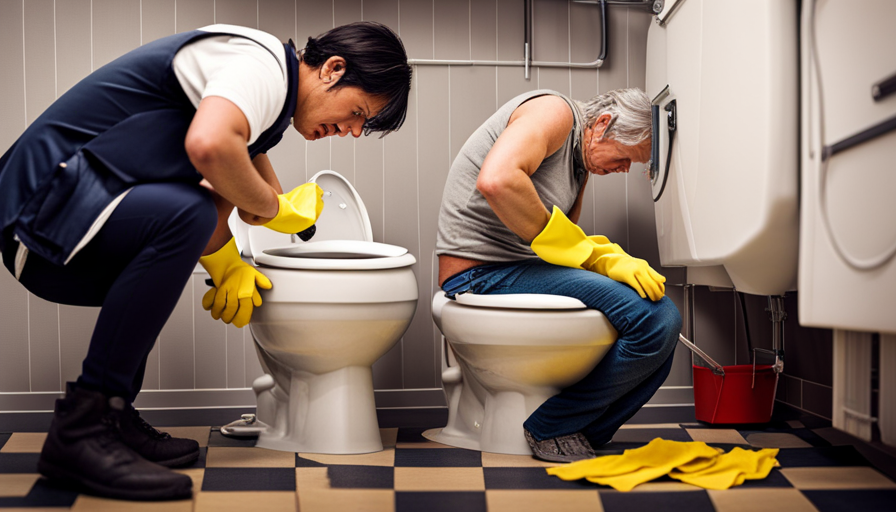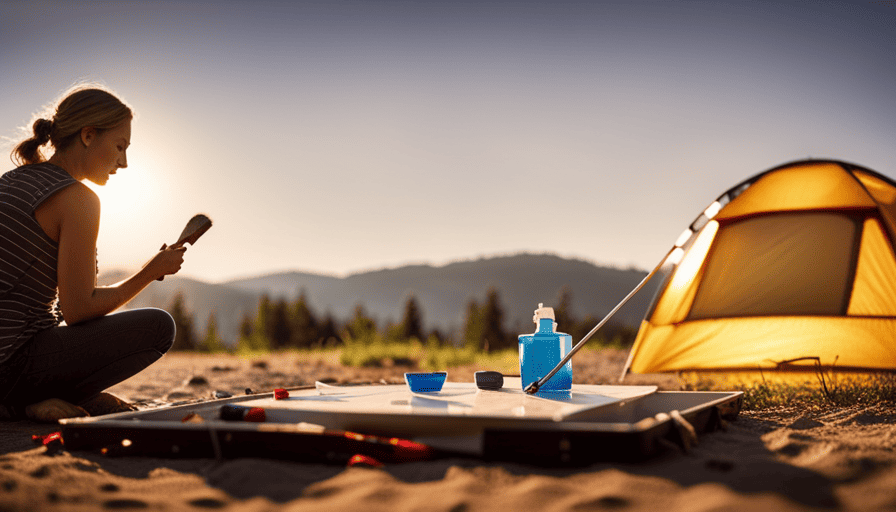You have decided to embark on an exciting camping trip, ready to explore the beauty of nature. Little did you know, you were not the only ones seeking shelter in your cozy camper. That’s right – the pesky little creatures known as mice have also decided to join in on the fun.
But fear not, my fellow adventurers, for I am here to guide you through the perilous journey of ridding your camper of these uninvited guests.
In this informative and practical article, we will explore a variety of techniques to reclaim your camper from these furry intruders. From identifying entry points and sealing them off, to setting traps and using natural deterrents, we will leave no stone unturned in our quest to restore peace and cleanliness to your home on wheels.
So grab your gloves, put on your detective hat, and let’s get those mice out of your camper once and for all!
Key Takeaways
- Identify and seal off all entry points in the camper, including windows, doors, walls, floor, pipes, and vents.
- Remove attractants and food sources by storing food in airtight containers and keeping the camper clean and clutter-free.
- Use a combination of traps, baits, and natural deterrents like peppermint oil and mothballs to trap and repel mice.
- Regularly clean and disinfect the camper, both inside and outside, to eliminate hiding places and prevent future infestations.
Identify Entry Points and Seal Them Off
If you’re tired of sharing your camper with unwanted furry guests, it’s time to identify those sneaky entry points and seal them off. Identifying entry points is crucial in keeping mice out of your camper.
Start by thoroughly inspecting the exterior of your camper, paying close attention to any gaps or cracks. Mice can squeeze through incredibly small spaces, so be thorough in your search. Common entry points include gaps around windows and doors, holes in the walls or floor, and openings around pipes or vents.
Once you’ve identified these areas, it’s time to seal them off. Use a high-quality silicone caulk or expanding foam to fill in any gaps or cracks. Make sure to pay attention to even the tiniest openings, as mice can easily find their way inside. Additionally, check the underside of your camper for any holes or gaps that need to be sealed.
By identifying entry points and sealing off gaps and cracks in your camper, you can greatly reduce the chances of mice finding their way inside. Now, let’s move on to the next section about removing attractants and food sources.
Remove Attractants and Food Sources
To ensure a mouse-free camper, you must first eliminate any temptations and food sources that may entice these uninvited guests, creating an environment they simply can’t resist. Here are four effective ways to achieve this:
-
Keep a cat as a deterrent: Consider bringing a cat along on your camping trips. Cats have a natural instinct to hunt mice, and their presence alone can discourage these critters from entering your camper. Their scent alone can act as a deterrent.
-
Seal food in airtight containers: Mice are attracted to the smell of food, so it’s crucial to store all your food in airtight containers. This will prevent any odors from escaping and luring mice into your camper.
-
Clean up spills and crumbs: Regularly sweep and clean your camper to remove any food spills or crumbs. Mice are resourceful and can survive on even the tiniest bits of food, so it’s important to keep your space tidy.
-
Use electronic mouse repellents: Consider using electronic mouse repellents that emit ultrasonic sounds. These devices are designed to be safe for humans but can deter mice from entering your camper.
By implementing these strategies, you can significantly reduce the chance of mice infesting your camper.
Now, let’s move on to the next step: setting traps and using baits to catch any remaining mice.
Set Traps and Use Baits
One effective method for dealing with these uninvited guests is by setting traps and using baits, ensuring that your camper remains mouse-free. To effectively set traps and use baits, it is important to understand the behavior of mice. They are curious creatures that are attracted to food and shelter. By removing attractants and food sources as discussed in the previous subtopic, you can increase the effectiveness of traps and baits.
To set traps, consider using live traps as they are humane and allow you to release the mice back into the wild. Place the traps strategically in areas where you have observed mouse activity, such as near entry points or along walls. Use baits such as peanut butter, cheese, or bacon to attract the mice to the traps.
Here is a table to help you choose the right trap and bait combination:
| Trap Type | Bait |
|---|---|
| Snap trap | Peanut butter |
| Glue trap | Cheese |
| Live trap | Bacon |
| Electric trap | Nutella |
| Humane trap | Sunflower seeds |
Once you have successfully trapped the mice, release them far away from your camper to prevent reinfestation.
In the next section, we will discuss how to use natural deterrents such as peppermint oil or mothballs to further protect your camper from mice.
Use Natural Deterrents such as Peppermint Oil or Mothballs
Surprisingly, peppermint oil or mothballs can actually repel those pesky mice from invading your camper. Using natural deterrents to repel rodents, such as peppermint oil or mothballs, can effectively keep mice out of your camper. Here are three ways you can use these natural solutions to keep your camper mouse-free:
-
Peppermint oil: Soak cotton balls in peppermint oil and place them in areas where mice are likely to enter, such as around doors, windows, and vents. The strong scent of peppermint oil is unpleasant to mice and will deter them from entering your camper.
-
Mothballs: Place mothballs strategically throughout your camper, focusing on areas where mice are known to enter or hide. The strong smell of mothballs is known to repel rodents, making them an effective deterrent.
-
Peppermint oil and mothball mixture: Combine peppermint oil and crushed mothballs in a spray bottle filled with water. Spray this mixture around the exterior of your camper, paying extra attention to potential entry points. The combination of these two natural deterrents can create a powerful barrier against mice.
Using these natural deterrents can help keep mice away from your camper and protect your belongings from damage. Once you’ve implemented these methods, it’s important to clean and disinfect your camper to ensure it’s mouse-free.
[Transition sentence to the next section about cleaning and disinfecting the camper].Clean and Disinfect the Camper
Cleaning and disinfecting the camper is an essential step in ensuring a mouse-free environment and protecting your belongings from potential damage. When it comes to cleaning methods, it’s important to be thorough and meticulous.
Start by removing any items from the camper and vacuuming all the surfaces, including the floors, walls, and furniture. Pay special attention to the areas where mice are known to hide, such as cracks, crevices, and corners.
After vacuuming, it’s time to disinfect. Use a disinfectant spray or a mixture of water and bleach to wipe down all the surfaces. This will not only kill any bacteria or viruses but also eliminate any mouse scent that may attract them back.
Don’t forget to disinfect the areas outside the camper as well, such as the storage compartments and underneath the camper.
To enhance the effectiveness of your cleaning and disinfection efforts, consider using disinfection techniques such as steam cleaning or using a UV-C light wand. These methods can help eliminate bacteria and viruses that are otherwise difficult to reach.
By thoroughly cleaning and disinfecting your camper, you’re removing any traces of mice that may attract them back. This sets the stage for the subsequent section about storing food in airtight containers, which is another important step in preventing mice from invading your camper.
Store Food in Airtight Containers
Storing food in airtight containers is essential to prevent any potential infestation, but what are the benefits of this method? Using airtight containers for food storage ensures that mice and other pests can’t access your pantry items. By sealing the containers tightly, you create a barrier that prevents odors from escaping and attracting unwanted visitors.
Additionally, airtight containers keep your food fresh for longer periods of time, reducing waste and saving you money. Organizing pantry items effectively is another advantage of using airtight containers. With clear containers, you can easily see what you have and avoid buying duplicates. You can also label the containers to quickly identify their contents, making meal preparation more efficient.
By keeping your pantry neat and organized, you minimize the chances of attracting rodents to your camper. As you transition into the next section about keeping the camper clean and clutter-free, it’s important to note that storing food in airtight containers is just one step in preventing infestations. To further safeguard against mice, it’s crucial to maintain a clean and clutter-free camper environment.
Keep the Camper Clean and Clutter-Free
Maintaining a clutter-free and clean camper environment is essential for preventing infestations and ensuring a safe and enjoyable camping experience. To keep mice out of your camper, it’s important to take preventive measures and create an environment that is unappealing to these pests.
Start by regularly cleaning your camper, sweeping and vacuuming to remove any food crumbs or debris that might attract mice. Pay special attention to the kitchen area, as this is where food is prepared and stored. Store all food in airtight containers to prevent mice from accessing it.
In addition to keeping your camper clean, you can also use natural deterrents to keep mice away. Peppermint oil is known to repel mice, so you can place cotton balls soaked in peppermint oil in areas where mice are likely to enter, such as near doors and windows. Another natural deterrent is using dryer sheets, as the strong scent can deter mice. Place them in areas where mice are likely to hide, such as under the seats or in storage compartments.
By following these measures, you can create an environment that is less attractive to mice and reduce the chances of infestation.
In the next section, we’ll discuss how to use ultrasonic repellents to further keep mice out of your camper.
Use Ultrasonic Repellents
To keep your camper free from unwanted critters, consider using ultrasonic repellents. They emit high-frequency sound waves that are unbearable to pests. These devices are a safe and effective way to deter mice and other pests from entering your camper. Here are five reasons why ultrasonic repellents are a great choice:
-
They’re non-toxic: Unlike chemical pesticides, ultrasonic repellents don’t pose any harm to humans or pets. You can use them with peace of mind, knowing that you’re not exposing yourself or your loved ones to harmful substances.
-
They cover a wide area: Ultrasonic repellents have a decent range, ensuring that the entire camper is protected from pests. They can effectively deter mice from every corner, nook, and cranny.
-
They’re easy to use: Simply plug the ultrasonic repellent into a power source, and it’ll start emitting high-frequency sound waves. There are no complicated installations or maintenance required.
-
They’re eco-friendly: Ultrasonic repellents don’t harm the environment. They’re a natural deterrent that doesn’t disrupt the ecosystem or leave behind any harmful residue.
-
They’re cost-effective: Investing in ultrasonic repellents can save you money in the long run. By preventing mice from entering your camper, you can avoid potential damage to your belongings, which could result in costly repairs.
To ensure complete peace of mind, it’s always a good idea to consult a professional pest control service.
Consult a Professional Pest Control Service
After trying out ultrasonic repellents and not seeing the desired results, I decided to consult a professional pest control service to get rid of the mice infestation in my camper. I knew that hiring a professional might involve some consultation fees, but I believed it would be worth it if it meant getting rid of the mice once and for all.
When I reached out to the pest control service, they scheduled an appointment at my convenience. The expert arrived promptly and conducted a thorough inspection of my camper to assess the extent of the infestation. They explained that mice are adept at finding small entry points and recommended sealing any gaps or openings to prevent future infestations.
The professional pest control service provided several effective solutions to eliminate the mice from my camper. They used a combination of traps, bait stations, and environmentally friendly rodenticides to ensure maximum effectiveness. They also offered valuable advice on how to keep my camper mouse-free, including proper storage of food and regular cleaning.
While professional pest control services may come with consultation fees, their expertise and access to more powerful solutions make them a reliable option. Now, armed with the knowledge and techniques they shared, it is time to take preventive measures to avoid future infestations.
Take Preventive Measures to Avoid Future Infestations
Armed with expert knowledge, techniques, and access to powerful solutions, I’m now ready to ensure my camper remains free from future mouse infestations. Taking preventive measures is crucial in avoiding these unwanted guests. Here are three natural deterrents that will help keep mice away from my camper:
-
Peppermint oil: The strong scent of peppermint is a natural repellent for mice. By placing cotton balls soaked in peppermint oil around the camper, I can create a barrier that mice will avoid.
-
Steel wool: Mice can squeeze through tiny openings, so it’s important to seal any potential entry points. By stuffing steel wool into gaps or holes, I can prevent mice from entering my camper.
-
Cleanliness: Mice are attracted to food sources, so maintaining a clean and tidy camper is essential. By regularly sweeping, vacuuming, and wiping down surfaces, I can eliminate crumbs and food residue that may attract mice.
By implementing these preventive measures, I can create an environment that is unappealing to mice and significantly reduce the chances of future infestations. It’s important to remain vigilant and take action as soon as signs of mice are detected. With these natural deterrents, I can enjoy a mouse-free camper and peace of mind during my travels.
Frequently Asked Questions
How do mice enter a camper in the first place?
When it comes to keeping mice out of a camper, it’s important to understand how they even get in the first place. Mice are sneaky little creatures and can fit through even the tiniest of openings. To seal entry points and prevent them from entering, make sure to inspect the camper thoroughly for any gaps or holes. Use caulk or steel wool to fill these openings.
Additionally, keep the camper clean and remove any potential food sources.
What are some common attractants that mice are drawn to in a camper?
Some common attractants that mice are drawn to in a camper include food crumbs, garbage, and nesting materials. Mice have a keen sense of smell and can easily detect these sources of food and shelter. If you notice common signs of a mouse infestation, such as droppings or chewed wires, it’s important to take immediate action.
Once you’ve successfully removed the mice from your camper, it’s crucial to safely clean up after the infestation to prevent any health risks.
Are there any specific types of traps or baits that work best for catching mice in a camper?
The best types of traps to catch mice in a camper are snap traps and live traps. Snap traps are effective at quickly killing mice, while live traps allow you to release them elsewhere.
For bait, peanut butter and cheese are the most effective options. The strong smell and taste attract mice, making them more likely to approach the trap.
Place the traps in areas where you’ve seen mouse activity for the best results.
How can peppermint oil or mothballs be used as natural deterrents for mice?
Peppermint oil has numerous benefits when it comes to deterring mice. It’s strong scent is a natural repellent that mice find unpleasant. To use peppermint oil as a deterrent, simply soak cotton balls in the oil and place them in areas where mice are likely to enter, such as cracks or holes.
Additionally, mothballs can also be used as an alternative natural deterrent. However, it’s important to note that both methods may need to be reapplied regularly to maintain their effectiveness.
What are some preventive measures that can be taken to avoid future mouse infestations in a camper?
To prevent future mouse infestations in a camper, there are several preventive measures you can take. Firstly, seal any cracks or gaps in the camper’s exterior to prevent mice from entering.
Keep the camper clean and free of food debris, as mice are attracted to food sources. Use peppermint oil or mothballs as natural deterrents, as these scents repel mice.
Additionally, store all food in sealed containers and regularly inspect the camper for signs of mice.
Can Mice Infestations Cause the Need for Replacement Camper Keys?
Mice infestations can indeed lead to the need for replacement camper keys. These tiny pests can find their way inside campers and wreak havoc on electrical wiring, insulation, and even vehicle interiors. In their search for food, they may chew through key fobs or keys, rendering them useless. Ensuring a pest-free environment is crucial to avoid the hassle of replacing camper keys.
Can Musty Smell in Camper Cushions Attract Mice?
Yes, the musty smell in camper cushions can attract mice. To prevent this, try these musty smell removal tips: sprinkle baking soda, use white vinegar, or place charcoal briquettes in the camper cushions to absorb the odors. Regularly airing out the cushions can also help prevent musty odors and discourage mice.
Conclusion
After following these practical and detailed steps, you can bid farewell to those pesky mice in your camper.
By identifying and sealing entry points, removing attractants, and setting traps with baits, you’ll quickly rid your space of these unwanted guests.
Don’t forget to utilize natural deterrents like peppermint oil or mothballs, and keep your camper clean and clutter-free.
Consider using ultrasonic repellents and consulting a professional pest control service if needed.
Remember, taking preventive measures will keep your camper mouse-free and ensure a peaceful camping experience.










